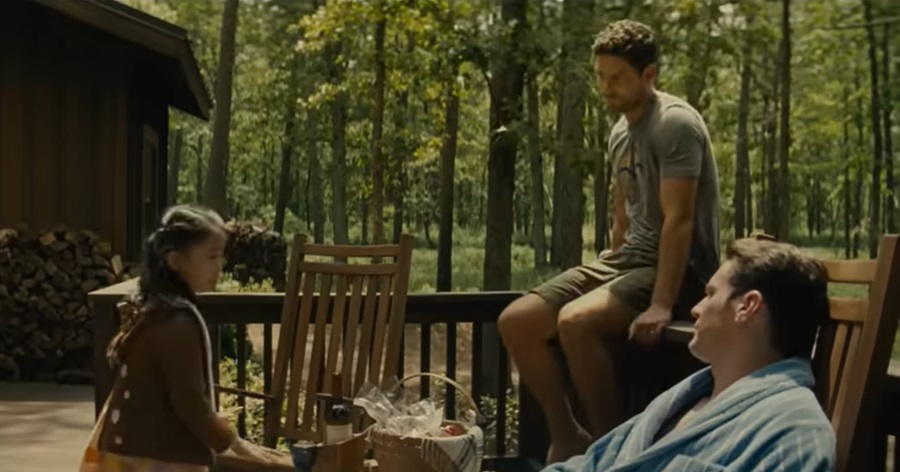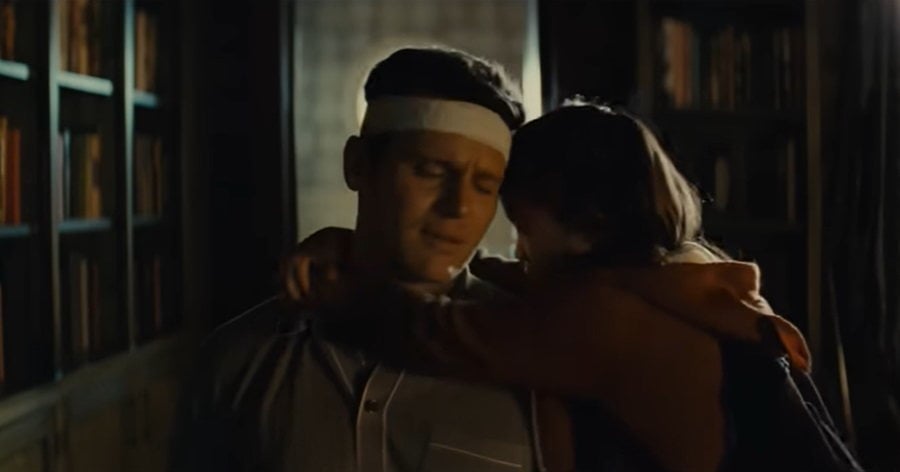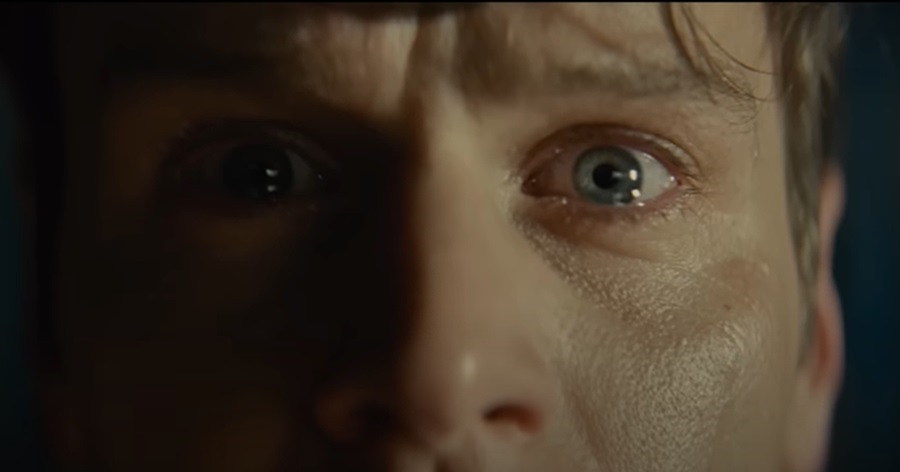M. Night Shyamalan’s Knock at the Cabin is a psychological thriller that plays with themes of faith, sacrifice, and apocalyptic dread. As with many of Shyamalan’s films, the ending leaves audiences questioning what they’ve witnessed, sparking debates over its meaning and implications. Let’s explore the film's ending and what it reveals about the story’s deeper themes.
• Knock at the Cabin follows a family—Andrew (Ben Aldridge), Eric (Jonathan Groff), and their adopted daughter Wen (Kristen Cui)—as they vacation in a remote cabin.
• Their tranquil getaway is disrupted when four strangers — Adriane (Abby Quinn), Leonard (Dave Bautista), Redmond (Rupert Grint), and Sabrina (Nikki Amuka-Bird)—arrive, claiming that the family must make an unimaginable sacrifice to prevent the apocalypse.
• The intruders insist that if the family does not willingly choose one member to sacrifice, the world will be plunged into chaos, leading to the death of millions.
• As tensions escalate, the family grapples with the terrifying choice before them, questioning whether these strangers are telling the truth or if they are victims of a deranged delusion.
The Book Behind the Movie: The Cabin at the End of the World
Knock at the Cabin is based on Paul Tremblay’s 2018 horror novel The Cabin at the End of the World. While the movie stays true to the book's central premise, the endings are starkly different. In the book, the story ends on a much more ambiguous and bleak note, leaving readers with a sense of unresolved tension. Tremblay’s novel is unflinching in its portrayal of the apocalypse, and the fate of the characters is left uncertain, with no clear resolution as to whether the world is saved or doomed.
In contrast, Shyamalan’s film provides a more definitive ending, where Eric’s sacrifice seems to avert the apocalypse, suggesting that the intruders’ prophecy was real. This divergence in the ending has been a significant talking point among fans of the book and movie alike, with many debating which version of the story is more impactful.
Plot Summary: A Tense Battle of Belief

The film opens with Eric, Andrew, and Wen enjoying their time at the isolated cabin. However, their serenity is shattered when Leonard and his companions forcefully enter, holding the family hostage. They reveal that they have been receiving visions of the end of the world and that one of the family members must be sacrificed to prevent global devastation.
As the narrative unfolds, the family learns that each time they refuse to make a choice, one of the intruders sacrifices themselves, triggering catastrophic events in the world outside. These events, such as tsunamis and plagues, are broadcasted on television, seemingly validating the intruders’ claims.
Eric and Andrew are forced to confront their disbelief, weighing the possibility that the intruders’ visions might be real against the unthinkable idea of sacrificing a loved one. As the intruders continue to die off, the family is left with an impossible decision that will determine the fate of humanity.
The Climax of Knock at the Cabin: A Final Sacrifice
The film’s climax sees Eric and Andrew struggling with the enormity of the decision they must make. As the world teeters on the brink of collapse, Eric, who has been more open to the idea of the intruders’ prophecy, ultimately chooses to sacrifice himself. He believes that the visions are real and that his death will prevent the apocalypse.

After Eric’s self-sacrifice, the world slowly begins to stabilize, suggesting that the prophecy was indeed true. Andrew and Wen are left to pick up the pieces, driving away from the cabin as they listen to news reports indicating that the disasters have subsided. The film ends on a haunting note, leaving audiences to ponder the cost of the sacrifice and the nature of belief.
The Ending of Knock at the Cabin Explained
The ending of Knock at the Cabin is a harrowing culmination of the tension and moral dilemmas presented throughout the film. After being confronted with the terrifying possibility that the world is ending, Eric and Andrew are forced to decide whether to believe the intruders' apocalyptic visions. As the disasters around the globe seem to confirm the prophecies, the stakes become clear: one of them must die to save the rest of humanity.
Eric, who has been more receptive to the idea that the visions might be real, ultimately makes the heart-wrenching decision to sacrifice himself. He believes that his death is necessary to prevent the apocalypse and save his loved ones. This act of self-sacrifice is portrayed as a profound gesture of love, one that underscores Eric's belief in something greater than himself.
After Eric’s death, the world begins to stabilize, suggesting that the sacrifice was indeed required to stop the catastrophic events. Andrew, left to grapple with the loss of his partner, drives away from the cabin with Wen, listening to news reports that hint at the disasters subsiding. The film closes on a haunting and ambiguous note, leaving viewers to question the morality of the choices made and the true nature of the events they have witnessed.
The ending raises several questions: Was Eric’s sacrifice truly necessary, or was it a tragic mistake driven by fear and manipulation? Did the events unfold as the intruders predicted, or was it all a horrific coincidence? The film leaves these questions open, allowing audiences to interpret the story in different ways and reflect on the themes of faith, sacrifice, and the human condition.Bottom of Form
Eric’s Vision: Was It Real or Hallucination?

A critical moment in the film is when Eric sees a figure in the light, which he interprets as a divine sign confirming the intruders’ prophecy. This vision plays a pivotal role in his decision to sacrifice himself, as he takes it as proof that their claims are true. However, the film leaves it ambiguous whether this figure was a genuine supernatural vision or simply a hallucination brought on by the intense psychological stress Eric was under.
This ambiguity adds to the film’s tension, forcing viewers to grapple with the question of whether Eric’s sacrifice was a necessary act of faith or a tragic mistake born of desperation and fear.
Leonard and His Group's Refusal to Kill Eric and Andrew
Leonard and his group, despite their insistence on the need for a sacrifice, refuse to kill Eric and Andrew themselves. This refusal is rooted in their belief that the sacrifice must be a willing act of love, not one of violence. According to their visions, the apocalypse can only be averted if a family member willingly chooses to die out of love for the others. This belief drives the tension in the film, as it places the burden of choice squarely on Eric and Andrew, forcing them to confront the possibility that they might need to make the ultimate sacrifice.
The intruders’ refusal to take direct action also reflects their own moral dilemmas. They are portrayed as ordinary people caught up in extraordinary circumstances, each deeply conflicted about the horrific task they believe they’ve been given. This nuance adds depth to their characters, making them more than just villains; they are tragic figures, tormented by the roles they believe they must play.
Eric’s Big Sacrifice: The Reason Behind It
Eric’s decision to sacrifice himself is rooted in a deep sense of responsibility and love for his family. Throughout the film, he wrestles with the possibility that the intruders’ prophecy might be real, and his growing belief in their vision is compounded by the apocalyptic events unfolding around the world. Ultimately, Eric chooses to sacrifice himself to save Andrew and Wen, believing that his death will prevent the end of the world.
Eric’s sacrifice is portrayed as an act of ultimate love and faith, a selfless decision made to protect his family and humanity. It’s a heartbreaking moment that underscores the film’s themes of sacrifice, belief, and the lengths to which people will go to protect their loved ones.
How the Audience Reacted to the Ending?
The ending of Knock at the Cabin has sparked a wide range of reactions from audiences. Some viewers appreciated the film’s clear resolution, finding Eric’s sacrifice to be a powerful and moving conclusion. Others, particularly fans of the book, were disappointed by the more definitive ending, feeling that it undercut the ambiguous and unsettling tone of Tremblay’s novel.
Many audience members have also been left debating the film’s central themes and the morality of the choices made by the characters. The ambiguity surrounding Eric’s vision and the true nature of the apocalypse has fuelled discussions about the nature of faith, the consequences of belief, and the ethical dilemmas posed by the story.
What Does the Title Knock at the Cabin Mean?
The title Knock at the Cabin holds a layered meaning that resonates throughout the film. On a literal level, it refers to the moment when the four strangers knock on the door of the cabin, setting off the chain of events that drive the story. However, the title also carries symbolic weight, representing the intrusion of an unavoidable fate knocking on the door of the family’s peaceful existence.
In a broader sense, the "knock" can be seen as a metaphor for the arrival of a moral dilemma that demands an answer. It’s an inescapable call to action, one that forces the characters to confront their deepest fears and make a decision that will reverberate far beyond the confines of their isolated cabin.
How the Director Explained the Title and Themes
M. Night Shyamalan has shared insights into the meaning behind Knock at the Cabin, highlighting the themes of faith, choice, and the human condition. According to Shyamalan, the film is about the tension between believing in something greater than oneself and the struggle to maintain control in the face of chaos. The title, with its ominous tone, underscores the inevitability of this confrontation, as well as the idea that some choices cannot be avoided.
Shyamalan also points out that the "knock" symbolizes the intrusion of outside forces—be it fate, destiny, or divine will—into the safe spaces we create for ourselves. The film explores what happens when these forces are no longer kept at bay, and we are forced to confront them head-on, often with life-altering consequences.
Conclusion: A Haunting Moral Tale
Knock at the Cabin is more than just a thriller; it’s a meditation on faith, sacrifice, and the human need to find meaning in the face of inexplicable events. The film’s ending, with its blend of resolution and ambiguity, challenges audiences to think deeply about the nature of belief and the lengths we will go to protect what we hold dear.
In the end, Knock at the Cabin leaves us with a chilling reminder of the power of faith and the consequences of our choices, even when those choices are forced upon us. It’s a film that lingers in the mind, prompting questions about fate, free will, and the price of salvation in a world filled with uncertainty.Bottom of Form






